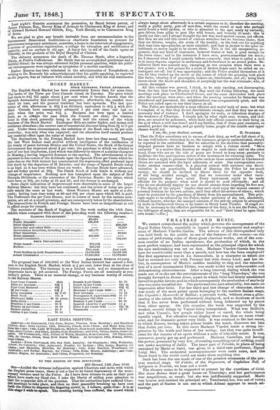THEATRES AND MUSIC.
We cannot comprehend the policy which governs the management of the Royal Italian Opera, especially in regard to the engagement and employ- ment of Madame Viardot-Garcia. The advent of this distinguished lady was held forth to the public as one of the features of the season—as the means of performing some of those great classical works, out of the com- mon routine of an Italian operahouse, the production of which, In the most perfect manner, had been represented as the principal object for which the new undertaking was set on foot. Madame Viardot-Garcia has been here for considerably more than a month, and how has she been employed? Her first appearance was in La Samna nzbula, in a character in which she had to contend not only with Pereiani but with Jenny Lind; and her de- bat, in consequence of Mario's sudden inability to sing and the substitu- tion of a most incompetent Elvino, was made under very unfavourable and disheartening circumstances. After a long interval, during which she was made use of to eke out the entertainments of the "long Thursdays," she was brought forward in Donna Anna, a part in which Grisi had firmly established herself in public favour, and in which consequently the production of anybody else was quite uncalled-for. She performed the part admirably, but made no impression after Grisi. For her third and last change of character, choice was made of the most paltry opera belonging to the modern Italian stage, the Capuleti e Honteechi of Bellini; a juvenile work, without even a glim- mering of the talent Bellini afterwards displayed, and so destitute of merit that it has never been performed without being bolstered up by pieces from other operas. On this occasion the weak was supported by the weaker, several things by Vaccai being interpolated. What was Bellini's, and what Vaccai's, few people either knew or cared, the whole being equally vapid. For effective vocal display there was thus no room what- ever, and for dramatic power very little. It was confined to the last scene, in which Romeo, having taken poison beside the tomb, discovers too late that Juliet yet lives. In this scene Madame Viardot made a strong im- pression by the truth and force of her acting; but that was quite insuffi- cient for the success of an opera without a note of tolerable music. It was, moreover, poorly got up and performed. Madame Castellon, not having the power, possessed by very few, of creating something out of nothing, could not make anything of Juliet. The tenor part of Tehaldo, in place .of being sustained by Mario or Salvi, was given to a third-rate performer, Signor Luigi Mei. The orchestral accompaniments were mere noise, and the finest band in the world could not make them anything else. Such lush been the use made of one of the greatest ornaments of the pre- sent musical stage. Of Fidelio, of the Huguenots, of (high:ante Tell, of Iphigenia in Tauride, we hear not a word. The theatre seems to be supported at present by the exertions of Grisi. Her Anna Baena drew a great house on Thursday; and her performance was magnificent, as usual; but she was indifferently supported. Mario was hoarse, and omitted his principal air; Tamburini, too, was out of voice; and the part of Smeton is not one in which Alboni appears to much ad- vantage.
























 Previous page
Previous page